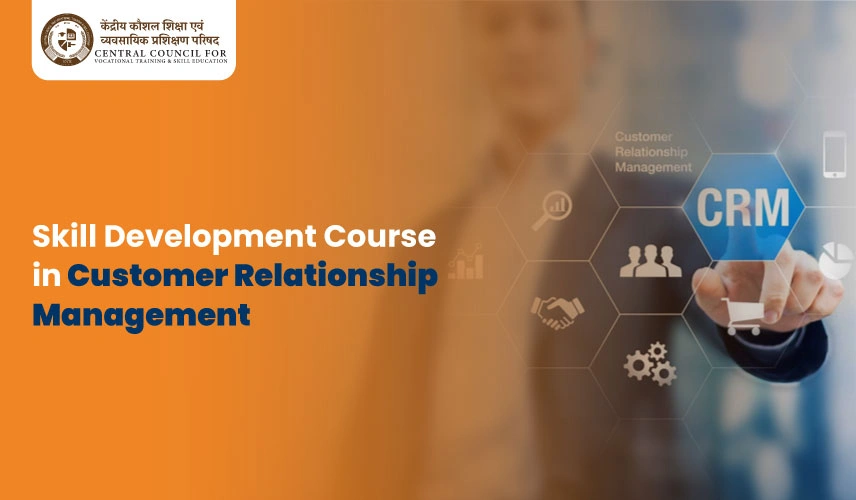- +91 8595350621
- info@ccvte.org
- C4/97B, Keshav Puram, Delhi-110035
Customer Relationship Management

Skill Development Program in Customer Relationship Management (CRM)
Customer Relationship Management (CRM) is a strategic approach used by organizations to manage interactions with current and potential customers, aiming to improve customer relationships, increase sales, and enhance customer service.
About Customer Relationship Management (CRM)
CRM systems facilitate the collection and analysis of customer data, enabling personalized communication and informed decision-making. Key components of CRM include customer data management, sales automation, marketing automation, customer service and support, analytics and reporting, and system integration. The benefits of CRM are significant, including improved customer relationships through personalized interactions, increased sales due to streamlined processes, enhanced customer service with faster response times, data-driven decision-making, and overall operational efficiency. Various types of CRM systems exist, such as operational CRM focusing on automation, analytical CRM emphasizing data analysis, and collaborative CRM facilitating inter-departmental collaboration.
Popular CRM software includes Salesforce, HubSpot CRM, Zoho CRM, Microsoft Dynamics 365, and Pipedrive, each offering unique features tailored to different business needs. Implementing CRM involves defining objectives, choosing the right CRM solution, migrating data, customizing the system, training employees, and continuously improving CRM practices to ensure optimal performance and effectiveness.
Why did you choose the Customer Relationship Management (CRM) Course from CCVTE?
Choosing a Customer Relationship Management (CRM) course from a CCVTE offers several advantages:
- Industry-Relevant Curriculum: We provide up-to-date and practical knowledge that aligns with current industry standards and demands.
- Expert Instructors: Our courses are typically taught by experienced professionals and researchers who are leaders in the field, ensuring high-quality instruction.
- Hands-On Experience: Our courses offer hands-on projects and real-world case studies, allowing you to apply theoretical knowledge and build a robust portfolio.
- Networking Opportunities: Enrolling in Our courses we can provide networking opportunities with peers, instructors, and industry professionals, which can be valuable for career growth.
- Certification: Upon completion, you often receive a recognized certification or diploma that can enhance your resume and improve job prospects.
- Access to Resources: Our courses usually provide access to a wealth of learning materials, tools, and platforms that can facilitate deeper understanding and practical skills development.
- Career Support: We provide career support services such as job placement assistance, resume reviews, and interview preparation, helping you transition into the workforce more smoothly.
Specialization in Customer Relationship Management (CRM)
- Sales Management
- Marketing Automation
- Customer Experience Management
- Data Analytics and Business Intelligence
- Customer Service Management
- Digital and Social Media Marketing
- Salesforce Administration and Development
- Account Management
- Customer Retention Strategies
- CRM Implementation and Project Management
- Industry-Specific CRM
Career opportunities
- CRM Manager
- Sales Manager
- Marketing Automation Specialist
- Customer Experience Manager
- Data Analyst
- Customer Service Manager
- Digital Marketing Manager
- Salesforce Administrator
- Account Manager
- Customer Retention Specialist
- CRM Consultant
- Business Development Manager
Syllabus
|
3 Months |
6 months |
1 Year |
2 Years |
|
Introduction to CRM |
Introduction to CRM |
Introduction to CRM |
Introduction to CRM |
|
CRM Strategies and Planning |
CRM Strategies and Planning |
CRM Strategies and Planning |
CRM Strategies and Planning |
|
Customer Data Management |
Customer Data Management |
Customer Data Management |
Customer Data Management |
|
Sales Automation |
Sales Automation |
Sales Automation |
Sales Automation |
|
Marketing Automation |
Marketing Automation |
Marketing Automation |
|
|
Customer Service Management |
Customer Service Management |
Customer Service Management |
|
|
Analytics and Reporting |
Analytics and Reporting |
Analytics and Reporting |
|
|
CRM Software and Tools |
CRM Software and Tools |
CRM Software and Tools |
|
|
Customer Experience Management |
Customer Experience Management |
||
|
Advanced CRM Techniques |
Advanced CRM Techniques |
||
|
CRM and Digital Marketing |
CRM and Digital Marketing |
||
|
Industry-Specific CRM Applications |
Industry-Specific CRM Applications |
||
|
CRM Project Management |
|||
|
CRM Trends and Innovations |
|||
|
CRM Implementation and Evaluation |
|||
|
Capstone Project and Review |
Top Hiring Companies
- HubSpot
- Salesforce
- Microsoft
- Oracle
- SAP
- Zoho Corporation
- Adobe
- IBM
- Zendesk
- SAP
- Pipedrive
- Freshworks
- SugarCRM
- Infor
- NICE Systems
Other Retail Courses Provided by CCVTE
Frequently Asked Questions
CRM stands for Customer Relationship Management. It involves strategies, practices, and technologies that companies use to manage and analyze customer interactions and data throughout the customer lifecycle.
- Sales professionals
- Marketing professionals
- Customer service representatives
- Business owners and managers
- IT professionals
- Ability to develop and implement CRM strategies
- Proficiency in using CRM software
- Skills in customer data analysis and reporting
- Enhanced customer service techniques
- Improved sales and marketing processes
Yes, most CRM courses include practical sessions where students can work with CRM software tools and applications to gain hands-on experience.
CRM Manager , Sales Manager , Marketing Automation Specialist , Customer Experience Manager , Data Analyst , Customer Service Manager , Digital Marketing Manager , Salesforce Administrator , Account Manager.




